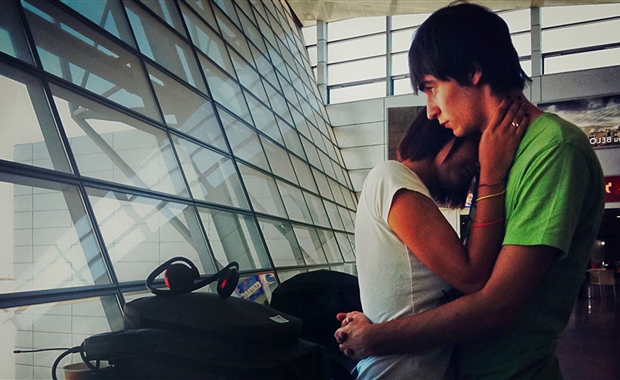The process of immigration to Israel – of Jewish immigration to Israel, to be precise – is described in English as Absorption; in Hebrew, it is merely reception. It is easy to assume that this is merely a matter of semantics, but after watching the candid House of Fun, one may very well think otherwise.

Screened in the Israeli Competition at the just-ended DocAviv, the Tel Aviv International Documentary Film Festival, House of Fun (the Hebrew title, נפלא פה, “wonderful here,” taken from the film’s theme song by Habiluim, has more of an ironic sting) takes an honest look at the process of absorption/reception; what we see is discomfiting in the main. Anchored around the experiences of a group of new migrants from the former republics of the Soviet Union, director Vitali Krivich captures, with candour, a cohort of teenagers trying to make sense of themselves and their lives in an alien landscape.
The mechanics of immigration to Israel are notoriously difficult to get to grips with – and I say this as an immigrant myself, albeit non-Jewish, and as such with an asterix beside my name, so to speak. Many native Israelis, I’ve found, assume that migration is part extension of the Taglit-inspired dream (sun, sand and sex, essentially), and part actualisation of a natural process of homecoming. If only.
Krivich’s subjects are young adults, that much is true. And as participants on a state-sponsored programme, they are Jewish, at least in the eyes of the law. But that’s where fantasy and reality part company. Even from the start, there are hints of ambivalence, at odds with the presumption of ideological fortification. One observes it was either Israel or learning a crappy profession back home. He’d discovered, almost by chance, that he qualified for the immigration programme because his grandmother was Jewish. Another says that her father suggested they visit the Jewish Agency offices, just to explore the options. Next thing she knows, he tells her that it’s time to get packing. Over my dead body, her mother retorts. “But I’m here. And she’s still alive,” the girl deadpans to camera.
Even when ideological soundness is in place, migration is a delicate and difficult act even at the best of times. (Trust me on this point.) But the framework that welcomes them is fantastically unresponsive. At their absorption centre in Carmiel, they are presented with a rigid routine for the day. From 7.00 to 23.00, your life will be fully regulated, their course director tells them. We believe in routine, he tells them. No drugs and no drinking or they’ll be expelled from the programme, he warns. But what happens if that is the case: do they get sent back home?
Teenagers being teenagers, their highly regimented daily routine is merely the framework against which boundaries can be tested. They are as rowdy and as dissolute as one might expect of any bunch of young people thrown together far away from home. But then, they live a curiously self contained and isolated existence within the absorption centre. It isn’t any surprise that they are chaffing at the reins much of the time. In any case, the much vaunted “routine” seems uninspired at best.
Living in Israel, one has always had the sensation of a peculiar tension between Olim Hadashim, new migrants, and veteran Israelis. The former are expected to shake the diaspora dust off their shoes and get on with the business of living; the former want, need, a guiding hand to reaffirm them in a choice deeply steeped in ideological conviction, but perhaps less by way of practical preparation. Well, supposedly steeped in ideological conviction. Either way, the gap between expectation and reality is hard to negotiate. One puts it thus: “At home, I was the Jew. Now, I’m the Russian. Ruski, Ruski, Ruski. And I’m not even from Russia!” There’s no clear cut formula for what it takes to become Israeli, but one gets the sense that whatever it is the young migrants are offered at Carmiel, it is not what is needed.
Whether House of Fun is intended as indictment of the system intended to absorb new migrants is perhaps a moot question. (It is worth pointing out that Krivich’s intimacy with his subjects comes, in part, from being an immigrant himself. Some are able to make the best of the circumstances within which they find themselves.) The interrogative revolves about something more profound: what does it mean to be Israeli, or to become Israeli? The weight of expectations that come with immigration to Israel – that come with Jewish immigration to Israel, not that there is much of any other kind – always threaten to overwhelm, and the emotional disintegration that Krivich captures in the last few minutes of the film should stand as a warning.
Given that Jewish immigration is the lifeblood of the Zionist enterprise (make of this statement what you wish), it seems strange that so much of the process is unknown and untested. Of all the things wrong with Israeli immigration policy, one would have thought that this would be the one to get right. Presuming, in that typically Israeli way, that הכל יהיה בסדר, (it’ll all turn out right in the end) is akin to – as someone famously put it once – hiding one’s head in the sand, and by doing so exposing one’s thinking parts.
House of Fun will be screened at the Jerusalem Cinematheque on May 18, 22 & 27th. Consult the cinematheque website for details and tickets.
House of Fun (Israel, 2013, 60 min, Hebrew and Russian with Hebrew and English subtitles)
Written and Directed by Vitali Krivich





